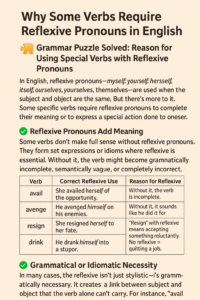Reason for Using Reflexive Pronouns with Certain Verbs-Grammar Puzzle Solved (17)
The reason for Using Reflexive Pronouns with Certain Verbs is a rule that must be learnt. It is a must. In English, reflexive pronouns—myself, yourself, himself, herself, itself, ourselves, yourselves, themselves—are used when the subject and object are the same. But there’s more to it. Some specific verbs require reflexive pronouns to complete their meaning or to express a special action done to oneself.
So, why do these verbs need reflexive pronouns? Let’s understand.
✔ Reflexive Pronouns Add Meaning
Some verbs don’t make full sense without reflexive pronouns. They form set expressions or idioms where the reflexive is essential. Without it, the verb might become grammatically incomplete, semantically vague, or completely incorrect.
Let’s look at four key examples:
| Verb | Correct Reflexive Use | Reason for Reflexive |
|---|---|---|
| avail | She availed herself of the opportunity. | “Avail” needs a reflexive to mean “make use of.” Without it, the verb is incomplete. |
| avenge | He avenged himself on his enemies. | Reflexive shows personal revenge. Without it, it sounds like he did it for someone else. |
| resign | She resigned herself to her fate. | “Resign” with reflexive means accepting something reluctantly. No reflexive = quitting a job. |
| drink | He drank himself into a stupor. | Reflexive adds result and emphasis—doing something extreme to oneself. |
✔ Grammatical or Idiomatic Necessity
In many cases, the reflexive isn’t just stylistic—it’s grammatically necessary. It creates a link between subject and object that the verb alone can’t carry. For instance, “avail the opportunity” is incorrect—only “avail oneself of the opportunity” is accepted.
Final Thought
Use reflexive pronouns with certain verbs because they form idiomatic expressions or require the object to refer back to the subject. Ignoring reflexive pronouns in such cases results in grammatical errors or loss of meaning.
The reason for Using Reflexive Pronouns with Certain Verbs is one of the most crucial rules in English Grammar. The learning of this rule would enhance the knowledge of the learner. Frequent visits to my site would enhance the knowledge of learner.

Piers Plowman Poem Summary:
https://englishlitnotes.com/2025/06/07/piers-plowman-poem-summary/
Emily Dickinson: https://americanlit.englishlitnotes.com/emily-dickinson/
First Year at Harrow: https://englishwithnaeemullahbutt.com/2025/06/02/first-year-at-harrow/
Who vs whom: https://grammarpuzzlesolved.englishlitnotes.com/who-vs-whom/
For grammar lessons, visit ChatGPT to explore the platform and interact with the AI: https://chat.openai.com
Discover more from Grammar Puzzle Solved by Naeem Ullah Butt
Subscribe to get the latest posts sent to your email.